- Home
- David Lubar
Sophomores and Other Oxymorons Page 4
Sophomores and Other Oxymorons Read online
Page 4
Now what?
A young teacher stood by the far wall, leaning against the windowsill, her arms crossed in front of her chest like she was waiting for a bus. I guessed that was Ms. Denton. When I caught her eye, she pointed next to her, where five buckets and mops had been lined up. On the windowsill behind each mop, I saw a bottle of water.
I walked across the room with my fellow upchuckers, and grabbed a bucket. I was relieved to see that Ike Yamamoto was part of our wretched trio. He was a wrestler, and pretty tough, so nobody was going to make fun of us. At least, not as a group. Our third gastric buddy was Chelsea McCabe, whose father was the chief of police. I was pretty sure she was immune from teasing. From what I’d heard, guys were even afraid to ask her out. Nobody wanted to get on the wrong side of the law.
After I’d mopped up my mess, and rinsed my mouth with one of the water bottles, Ms. Denton had us take the buckets back to the janitor’s closet. At least Lee had saved a seat for me. I dropped down in it and assured myself that the worst part of the day was over.
“That is totally unacceptable,” Lee said. “I’m writing a letter to the school board.”
“Yeah,” I said. “It does seem kind of cruel.”
“Cruel? What are you talking about?” she asked.
“What are you talking about?”
“The bottled water,” she said. “There’s no excuse for that. It’s a waste of resources, and an unnecessary expense. The local tap water is fine.”
“I thought you were talking about the cat,” I said.
Before Lee could respond, Ms. Denton, who’d moved to the front of the room, got things started. She leaned against the lab table, just to the left of the cat. “Welcome to biology,” she said. “You’ll get used to it.” She paused a moment before adding, “Or fail.”
Sheila Bergstrom, who was about to regret her decision to wear pink today, and her parents’ decision to pass along their Nordic heritage in the form of blond hair and blue eyes, raised her hand. “Is that . . . ?” She pointed at the cat.
“Relax, Barbie. That’s for AP,” Ms. Denton said. “College prep biology doesn’t require you to dissect a cat.”
Relief flowed through the room, mingled with scattered sighs of deep disappointment from the science crowd. My own relief was two-pronged. I was happy that I wouldn’t be getting intimately familiar with the inside of a cat. I was also pleased that Sheila might have just won the role of least-favorite student. If so, I could add another slick escape to my achievements for the day.
“No cat for this class,” said Ms. Denton. “We’ll have to settle for a fetal pig.”
The image of baby-sized strips of unborn pig sizzling in a pan almost booted the few remaining drops of digestive juices and tortilla sludge from my stomach, but I managed to choke back the nausea.
Lee patted my arm. “Fear not. I’m sure little Hamlet died of natural causes.”
As I got ready to point out the unlikeliness of that, she laughed and shot me a can’t-you-tell-when-I’m-kidding? look.
I returned my attention to the front of the room, where Ms. Denton had started taking attendance. She frowned when she reached my name. “Scott Hudson . . . ,” she said. “Any relation to Bobby?”
Oh, great. . . .
I contemplated lying, but settled for saying, “Brother.”
Last year, I’d managed to live down, or transcend, my brother’s reputation with any of my teachers who’d encountered him during his stormy and incomplete passage through Zenger High. I guessed I was going to run into a new batch of teachers who’d encountered him during his sophomore year.
“You’re not like him,” she said.
Her tone was so flat, I couldn’t tell whether her words were a statement, a question, or a wish. I settled for replying, “No. I’m not.”
When the bell rang, I swung to the side of the room, keeping as far from the front table as possible. Lee walked over to the cat, pointed at something within, and asked, “Is that the heart?”
Ms. Denton moved to her side, glanced down, and said, “Yes, Morticia.”
Lee ignored the name, though I’m sure she recognized the Addams Family reference, and shifted her finger. “Liver?”
Ms. Denton nodded. Ironically, she was the one, like Morticia Addams, who had long, dark hair and a pale complexion. She picked up a probe and touched something.
“Kidneys?” Lee guessed.
Another nod. “Very good. You should think about transferring to AP. It’s not too late.”
“I’ll give it some thought,” Lee said.
As we left the room, I said, “Maybe you really should. . . .”
“Nope,” Lee said. “That would cause all sorts of parental expectations that I really don’t want to have to live up to.”
“You shouldn’t not do something just because your parents would approve if you did it,” I said.
Lee patted me on the back. “Double negative with a half twist. But you stuck the landing. Nice job, English geek.”
“I’m not an English geek,” I said.
“My apologies,” Lee said. “You’re a multi-faceted geek, with broad skills in a variety of disciplines, and a brain crammed with more than five thousand amazing facts.”
“Okay. I’ll admit to that. But you’re dodging the issue. If you don’t take AP just because it would please your parents to see you strive, you’re cheating yourself.”
“If I take AP, who’s going to pat you on the back and offer comforting words after you spew tacos and fudgy bubbles?” she asked.
I let it go. Sometimes, arguing with Lee was like playing table tennis with an octopus. There was no way to get a shot past her.
She checked her schedule, pressed the back of her hand against her forehead in a fake swoon, and said, “Alas, it is here we part. I will try to be brave until we reunite.”
“See you ninth period,” I said. I added, “Morticia,” when she was almost out of earshot.
She saluted at me over her shoulder with her middle finger. I took that as a sign of affection.
I headed for Life Skills. I had Ms. Pell, again. That was fine. She told us we’d be spending our first week learning how to balance a checkbook and reconcile an account statement. That was also fine. After an uneventful 5th period of checks and balances, I headed for Spanish.
“Hola, mi estudiantes. Me llamo Señorita Morena,” sayeth the teacher.
“Hola, Señorita Morena,” sayeth the class.
And that’s pretty much all there was to sayeth about sixth period.
I had Mr. Cravutto again for gym. I’d sort of hated him last year, until I’d started to get in shape. Kyle was in my class this year. We’d been friends since kindergarten, and then, one day, we weren’t friends anymore.
He caught me staring at him as we headed into the locker room. To my surprise, he smirked, like he’d played some sort of joke on me. That was a change from the guilty look he’d worn right after he’d betrayed me last year, and the ensuing anger at one’s victim that often followed guilt. The look worried me. I made a note to keep my eyes open. Especially in the locker room.
We suited up and went outside. Mr. Cravutto didn’t bother giving us an introductory talk. We didn’t need it. We knew the drill. And talking wasn’t a big part of his skill set.
“Renzler,” he said, pointing at one of the kids from the JV football team, “warm-up exercises.”
“Yes, COACH!” Renzler said.
Apparently, among those who participate in a large amount of extracurricular athletics, the word “coach” can never be spoken at a conversational volume.
Randy Renzler got in front of the class and ran us through the usual exercises while Mr. Cravutto stood to the side and scanned the double doors that led in and out of the gym as if he were waiting for an important package from UPS.
Afte
r we’d been thoroughly warmed up, Renzler shouted, “Now what, COACH?”
Mr. Cravutto pointed to the track. “Laps,” he said.
Sadly, he didn’t mean for us to sit and form them.
Right before we finished our first lap, the girls’ class came out, carrying field-hockey sticks. They headed to the field. Mr. Cravutto headed over to the girls’ teacher and started talking.
So that’s where his mind was.
We ran.
He talked.
Apparently he had a lot to say. I couldn’t hear the conversation, but I could guess parts of it, based on his hand gestures. He was telling her all about his sporting skills. Or he was playing a very active one-sided game of charades, trying to get her to guess the phrase, “struck by lightning.” She kept nodding and glancing toward the field, where the girls had divided into two teams and started a game.
We kept running.
Eventually, a couple kids flopped to the grass next to the track. Soon after that, several more draped themselves over seats in the bleachers. I slowed down, but I figured I could keep jogging for a while. Mr. Cravutto had to notice us sooner or later.
Or so I thought.
When my legs and lungs signaled that they were going on strike, I dropped out. It pleased me that I’d lasted so long. The only remaining runners were three kids from the cross-country team, and two football players who must have been desperate to impress their coach, but were totally unaware that he would never notice their amazing acts of loyalty and endurance while a female member of the sweatclothes-and-whistles clan was in the vicinity.
Mr. Cravutto had more stamina than I did. He was still shooting his mouth off when the bell rang.
The bell!
We were supposed to be showered and changed before the bell.
Both gym teachers looked at the building as if they’d been startled out of a deep sleep, then turned toward us and blew their whistles.
Some of the kids ran for the locker room. I didn’t care if I was late for art. I walked. There was no way I could sprint. After I took the quickest shower in the history of perspiration removal, I got dressed and headed for Mr. Cravutto’s office for a late slip. There was a line of kids ahead of me. I heard Mr. Cravutto repeating, “You don’t need a slip. Tell your teacher I said it was okay.”
I figured that waiting around until I reached the front of the line would just make me later. So I headed for art.
The late bell had already rung.
The teacher, Mr. Belman, lobbed a sneer in my direction. “Nice of you to join us.”
Oh, great. I didn’t want to get on his bad side. I liked art. I launched into my excuse. “Mr. Cravutto—”
“Say no more,” Mr. Belman said. The sneer melted into a grimace of sympathy. “You’re excused.”
“Thanks.” That was a relief. All the seats were taken, except for one next to “Sardine Breath” Sabretski. Great. But I guessed, right then, I could give him some competition in the aromatic department. It could have been worse. At least it wasn’t a class that required massive exhalations, like chorus or candle snuffing. I dropped down on the stool and drew in a big sigh of relief, just as my neighbor let out the sigh of someone who’s lost personal space.
As I sat there trying to purge my lungs, I noticed that one of the counters under the windows was filled with empty glass bottles. There were all sorts, from tiny perfume bottles in fancy shapes to large bottles that looked like they once held wine or olive oil. There were even several milk bottles from the dairy store that had closed way back when I was little.
“Pick three bottles,” Mr. Belman told the class. “Make sure they are different in as many ways as possible—height, circumference, profile, shape.”
Before the last long vowel of the last word of his sentence had left his mouth, we’d all leaped to our feet and stampeded toward the windows. I snatched at bottles, trying to get the best ones, even though I had no idea what defined “best” in this situation. It reminded me of those scenes on the news from Black Friday, when people trample their fellow humans in a frenzy to get the best bargains.
After I’d returned to my seat with my trophies, I thought about the way my whole nervous system had responded to the unexpected competition. My immediate fear had been that there wouldn’t be enough bottles for everyone. I had to make sure I got mine. It turned out to be an empty fear. There were plenty of bottles left on the counter after the onslaught, though not all of them were still standing. The unchosen bottles didn’t look any better or worse than the ones I’d grabbed. I couldn’t shake the worry that I’d made bad choices. As I scanned the room, and noticed how my classmates sat slightly hunched over their bottles, as if to protect them from being snatched away, I wondered what would have happened if there’d been a shortage.
We spent the rest of the period drawing our bottles, and seeing how they fit into a rectangle whose proportions Mr. Belman called the golden ratio. Then, the penultimate end-of-period bell of the day rang. Finally, after eight periods of regurgitation, sweat, triumphs, averted disasters, and misunderstandings, it was time for English.
And hubris.
FIVE
I ran into Lee on the steps to the second floor. “I hope the teacher is good,” I said. “I can’t imagine anybody topping Mr. Franka. Know anything about her?”
“Nope,” Lee said. “I mean, I’ve heard her name, and I think she’s been here for a long time, but I have no idea what she’s like.”
I shifted my bloated backpack—which had been fed a steady stream of textbooks—in an effort to find a more comfortable relationship between it and my shoulders.
“‘He walked heavily,’” Lee said in a deep voice.
“Huh?”
Lee gave me a funny look, and repeated the phrase.
“What are you talking about?” I asked.
“It’s from Of Mice and Men,” she said. “Right near the opening. Lenny is described as walking like a bear. You did read it, right?”
“I read it twice,” I said.
“When?” she asked.
“Uh . . . toward the end of sixth grade. And the summer after seventh.” As I spoke, I realized how long ago that sounded. I’d piled a lot of books onto my “finished it” list since then. A whole lot of books. A mass of paragraphs. A slew of scenes. A heap of descriptions.
“Risky,” Lee said.
“I’ll be fine,” I said.
“Of course you will. You seem to have a fair amount of Teflon on your surface,” she said. “From what you’ve told me, today seems to be no exception. You probably have nothing to worry about.”
“Yeah. It’s not like she’s going to slap us with a test the moment we walk in. I can skim the book tonight, to refresh my memory. It’s a quick read.”
We’d reached the room. Something seemed familiar, but also strange. The school was pretty old. Most of the classrooms had gotten dry-erase boards to replace the chalkboards over the years. And many had SMART Boards. But not this room. It had chalkboards. And it had faded grammar and literature posters that looked like they were from half a century ago.
Mrs. Gilroy, who was dressed in black slacks and a white long-sleeved blouse that seemed a bit too large for her, reminded me of the sort of young grandparent you see on the tennis courts, or in the ads for active retirement villages.
“She’s some kind of mythical creature that’s half Lee,” I whispered, pointing to the black pants, “and half pirate.”
“Very amusing,” Lee said.
“Welcome to Sophomore Honors English,” Mrs. Gilroy said. “It should come as no surprise to you that we’ll be immersing ourselves in literature this year. We’ll devote much of our time to savoring the joy and magic of our language.”
That sounded perfect for me.
“Words are my passion. I hope you’ll come to share that sentiment,” sh
e said.
This will be great, I thought as I settled into my seat.
“Who knows what sophomore means?” Mrs. Gilroy asked. She wrote the word on the board.
Wonderful. That’s the sort of thing Mr. Franka would do, to make the class interesting, leading us somewhere by way of questions. And it was the sort of word he’d pick to make the lesson special. There was something very cool about sophomores discussing the meaning of sophomore.
While Mrs. Gilroy’s back was turned, Josh Rosen said, “It means one year down, three to go.”
Mrs. Gilroy took her time turning back to the class. She shot Josh—who hadn’t lost his stupid grin—a glare that pretty much said Don’t say another word for the rest of the period. Josh slunk down in his seat. I felt a twinge of happiness as I realized that, unless she’d had Bobby in her class and held grudges, our teacher had already discovered her least-favorite student. Even if she’d taught Bobby, I’d never be a candidate for problem student in English class. It was my best subject, by far. Still, it was a relief to see the position filled by a highly qualified candidate. Josh was a bit of an ass.
Mrs. Gilroy underlined the first four letters of sophomore. “Where else do we hear soph?”
“Sophisticated,” I said. This was definitely my kind of lecture.
“Softball?” Josh said, quietly enough so Mrs. Gilroy didn’t hear him.
I tried to dredge up another example. A word danced in my mind, just out of reach.
“Philosophy!” Lee said, beating me to it.
Mrs. Gilroy snapped her fingers, then pointed at Lee. “Philosophy means . . . ?”
“Love of knowledge,” Lee said.
“Right,” Mrs. Gilroy said, awarding Lee a smile. “Let’s break it apart. We know philo is love.”
That was true. Anyone who’s lived in eastern Pennsylvania has learned that, thanks to constantly hearing how Philadelphia is the city of brotherly love.
“That leaves us with soph meaning what?” Mrs. Gilroy asked.

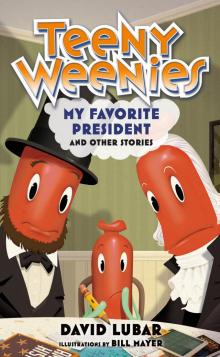 Teeny Weenies: My Favorite President
Teeny Weenies: My Favorite President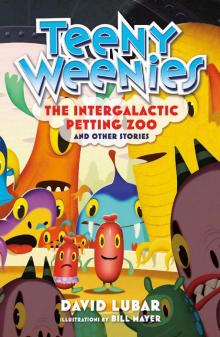 Teeny Weenies: The Intergalactic Petting Zoo
Teeny Weenies: The Intergalactic Petting Zoo Teeny Weenies: The Eighth Octopus
Teeny Weenies: The Eighth Octopus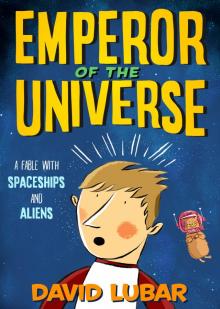 Emperor of the Universe
Emperor of the Universe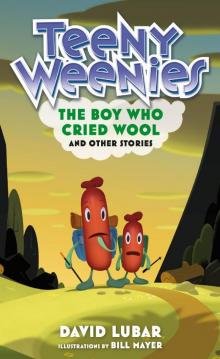 Teeny Weenies: The Boy Who Cried Wool
Teeny Weenies: The Boy Who Cried Wool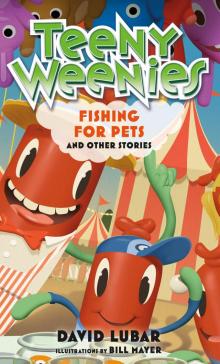 Teeny Weenies: Fishing for Pets
Teeny Weenies: Fishing for Pets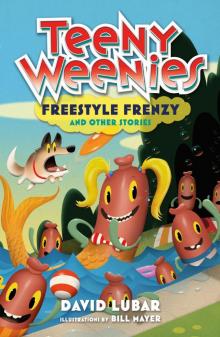 Teeny Weenies: Freestyle Frenzy
Teeny Weenies: Freestyle Frenzy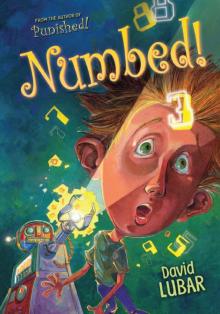 Numbed!
Numbed!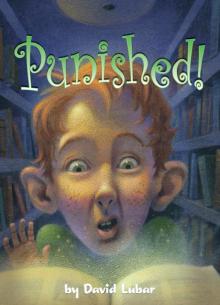 Punished!
Punished!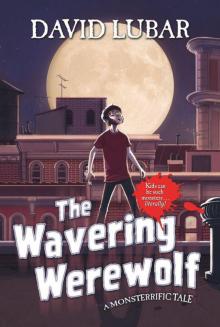 The Wavering Werewolf: A Monsterrific Tale (Monsterrific Tales)
The Wavering Werewolf: A Monsterrific Tale (Monsterrific Tales)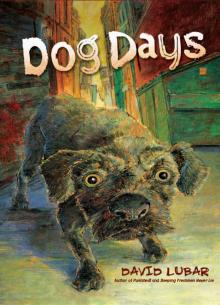 Dog Days
Dog Days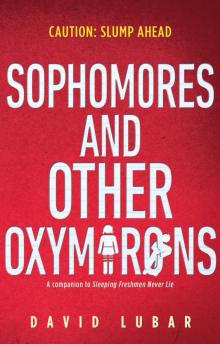 Sophomores and Other Oxymorons
Sophomores and Other Oxymorons The Psychozone
The Psychozone My Rotten Life
My Rotten Life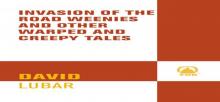 Invasion of the Road Weenies
Invasion of the Road Weenies In the Land of the Lawn Weenies
In the Land of the Lawn Weenies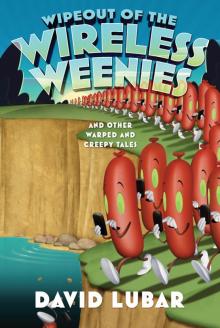 Wipeout of the Wireless Weenies
Wipeout of the Wireless Weenies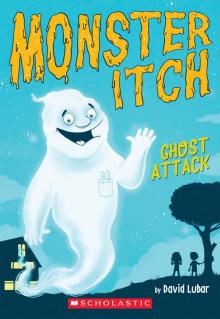 Ghost Attack
Ghost Attack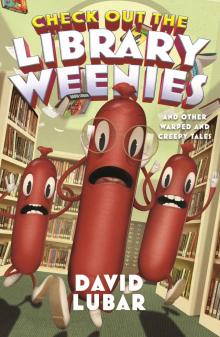 Check Out the Library Weenies
Check Out the Library Weenies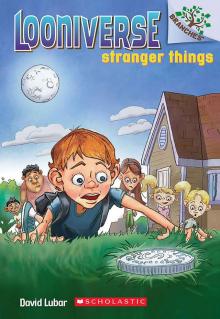 Looniverse #1: Stranger Things (A Branches Book)
Looniverse #1: Stranger Things (A Branches Book)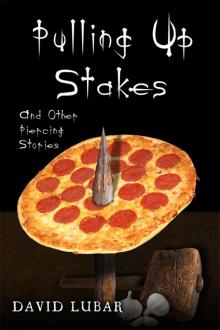 Pulling up Stakes and Other Piercing Stories
Pulling up Stakes and Other Piercing Stories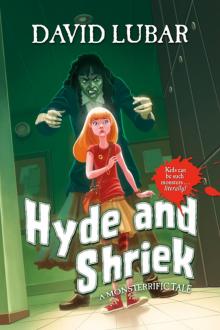 Hyde and Shriek
Hyde and Shriek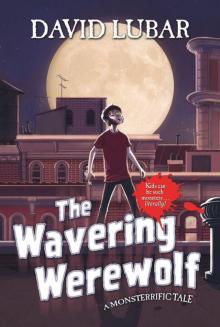 The Wavering Werewolf
The Wavering Werewolf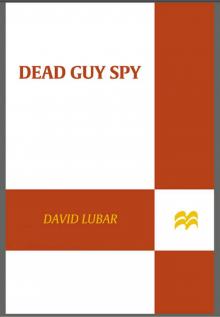 Dead Guy Spy
Dead Guy Spy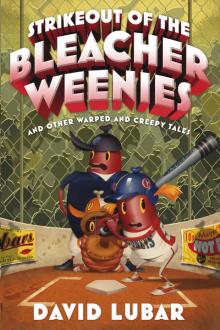 Strikeout of the Bleacher Weenies
Strikeout of the Bleacher Weenies The Big Stink
The Big Stink The Battle of the Red Hot Pepper Weenies
The Battle of the Red Hot Pepper Weenies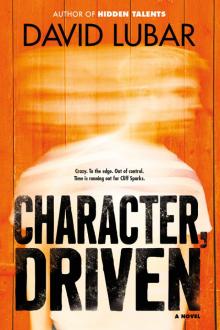 Character, Driven
Character, Driven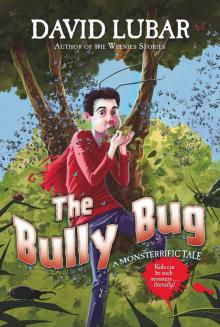 The Bully Bug
The Bully Bug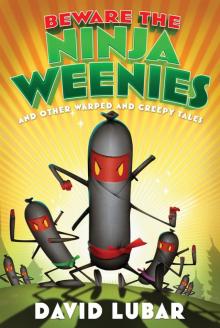 Beware the Ninja Weenies
Beware the Ninja Weenies Extremities: Stories of Death, Murder, and Revenge
Extremities: Stories of Death, Murder, and Revenge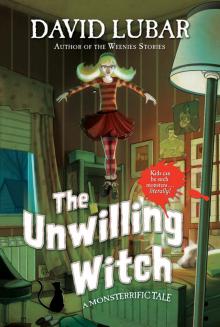 The Unwilling Witch
The Unwilling Witch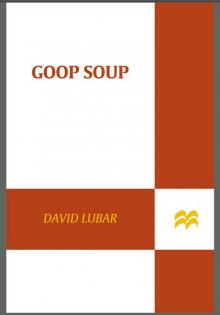 Goop Soup
Goop Soup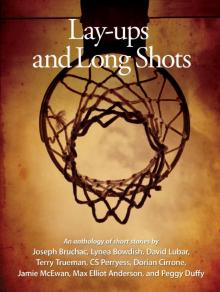 Lay-ups and Long Shots
Lay-ups and Long Shots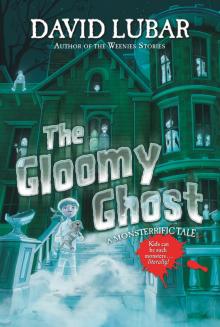 The Gloomy Ghost
The Gloomy Ghost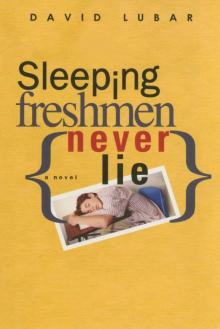 Sleeping Freshmen Never Lie
Sleeping Freshmen Never Lie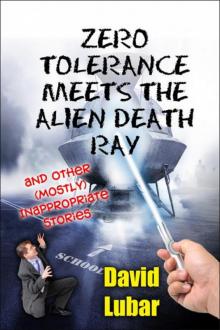 Zero Tolerance Meets the Alien Death Ray and Other (Mostly) Inappropriate Stories
Zero Tolerance Meets the Alien Death Ray and Other (Mostly) Inappropriate Stories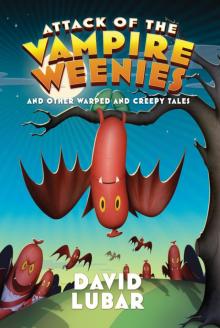 Attack of the Vampire Weenies
Attack of the Vampire Weenies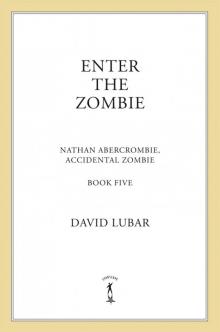 Enter the Zombie
Enter the Zombie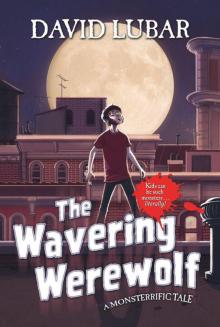 The Wavering Werewolf_A Monsterrific Tale
The Wavering Werewolf_A Monsterrific Tale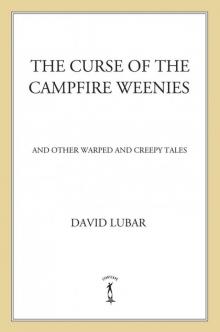 The Curse of the Campfire Weenies
The Curse of the Campfire Weenies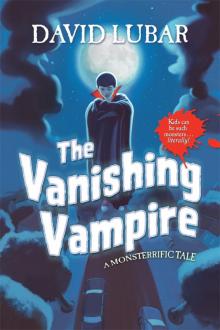 The Vanishing Vampire
The Vanishing Vampire